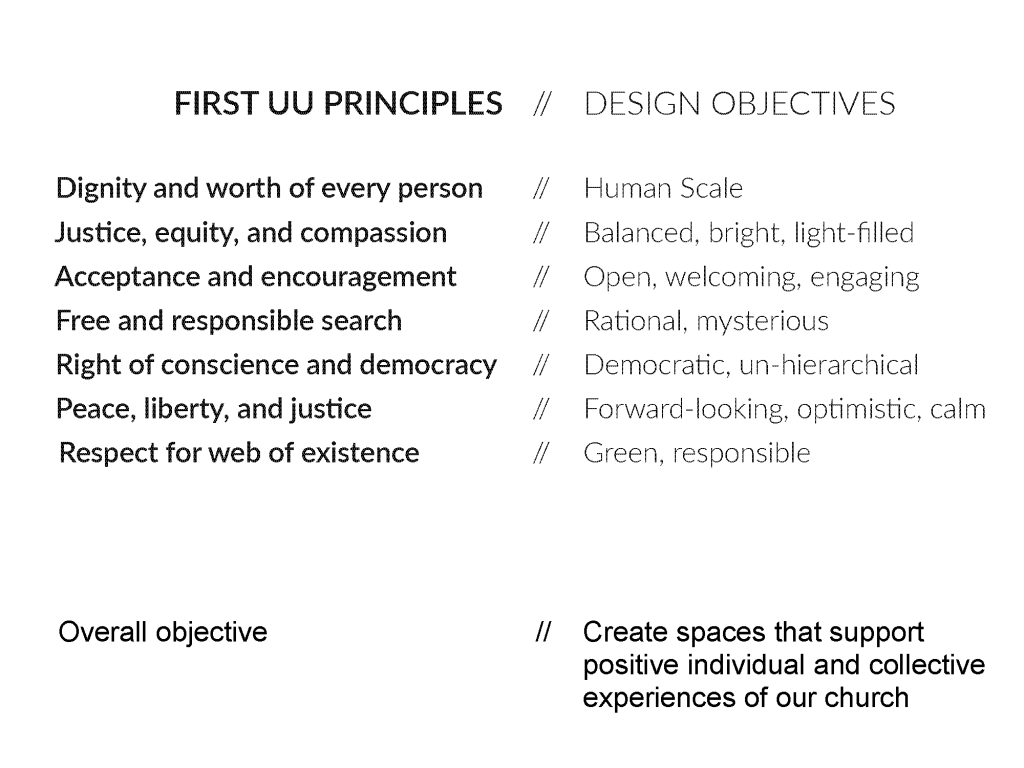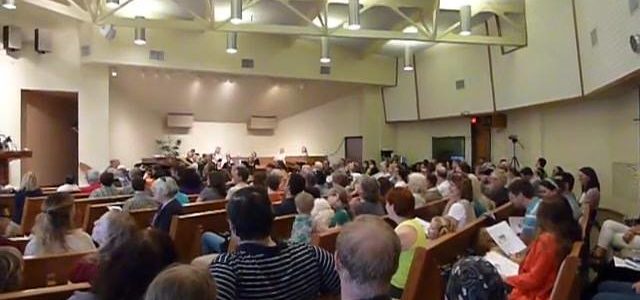Podcast: Play in new window | Download
Rev. Meg Barnhouse
April 3, 2016
First UU Church of Austin
4700 Grover Ave., Austin, TX 78756
www.austinuu.org
Is there an element in UU theology that parallels the punk movement’s do-it-yourself flair, its rejection of hippy-ness, its anarchist tendencies, iconoclasm, and attitude?
Call to Worship
“People Have The Power”
Patti Smith
I was dreamin’ in my dreamin’
Of an aspect bright and fair
And my sleepin’ it was broken
But my dream it lingered near
In the form of shinin’ valleys
Where the pure air recognized
Oh, and my senses newly opened
And I awakened to the cry
And the people have the power
To redeem the work of fools
From the meek the graces shower
It’s decreed the people rule
People have the power
People have the power
People have the power
People have the power
Vengeful aspects became suspect
And bending low as if to hear
Well, and the armies ceased advancin’
Because the people had their ear
And the shepherds [?] the soldiers
And they laid among the stars
Exchanging visions, layin’ arms
To waste in the dust
In the form of shinin’ valleys
Where the pure air recognized
And my senses newly opened
And I awakened to the cry
People have the power
People have the power
People have the power
People have the power
Where there were deserts, I saw fountains
Like cream the waters rise
And we strolled there together
With none to laugh or criticize
There is no leopard and the lamb
And lay together truly bound
Well I was hopin’ in my hopin’
To recall what I had found
Well I was dreamin’ in my dreamin’
God knows a pure view
As I lay down into my sleepin’
And I commit my dream with you
People have the power
People have the power
People have the power
People have the power
The power to dream, to rule
To wrestle the earth from fools
But it’s decreed the people rule
But it’s decreed the people rule
Listen, I believe everythin’ we dream
Can come to pass through our union
We can turn the world around
We can turn the earth’s revolution
We have the power
People have the power
People have the power
People have the power
The power to dream, to rule
To wrestle the earth from fools
But it’s decreed the people rule
But it’s decreed the people rule
We have the power
We have the power
People have the power
We have the power
Sermon
My sons have always loved cussing. I have no idea where they got that. When they were becoming teenagers, I let them have a new cusssword for each birthday. “Crap” was the first one, on their twelfth birthday. My older son must have used it in conversation at least 300 times that first day. Mostly with the ending “tastic” added, or “ton.” You hear that in your mind? OK. So, the word for their 18th birthday was the mother of all cuss words, and they were allowed to say it, only not in front of their mother, who never ever used that word herself, you understand.
Why am I telling you this? Because today we are talking about Punk Theology, so we’re talking about the Punk movement, and there is no way to talk about Punk without using the mother of all cuss words. A dilemma for the preacher. So, since the preacher grew up in Philadelphia, where (hand gesture flipping fingers out from under the chin) expressed a similar sentiment, we’ll use that gesture instead, with whatever combination word “You,” “this,” or “that” added for clarity. This way we will all survive this discussion with our dignity intact.
England in the 70’s. Margaret Thatcher the Iron Lady, closing down the coal mines, everyone on the dole, the kings of the music scene were Led Zeppelin. Overblown, guitar solos turned up to 11, satin pants and flowing curls, references to English folklore and the bustle in your hedgerow.
You have kids who had no hope of work. They had plenty to say, anger at the establishment, little chance of having the money for musical training, the long slog of unpaid effort it takes to get a record contract, no money for satin pants.
All of this is tremendously oversimplified – I’m just giving you an impression of what happened. “(Hand gesture) them!” We are going to express ourselves. Being authentic is the main thing, show our rage. Look cool. Make it clear that you are as far from satin pants as a person can get. Here, take some safety pins and stick them through your clothes. Clothes made all out of safety pins? Go for it. Stick some through your ear? Cool. Life is pain. We can take it. If you can shout, you can sing. Who needs long croony stairway to heaven songs? Make them short. Scream what you feel. Shout what you see about the world the way it is. Give it a hard edged melody and sing it in a hard voice. Can’t play an instrument? Here. This is a chord. Here are two more. Now, go write a song because all you need are these three chords. Loud. Fast. Aggressive. They think we’re angry, but loud and fast can be ecstatic too, and sexy too.
So many bands were trying to be Led Zeppelin without their genius. Pale imitations, then imitations of the imitations.
Let me read you something from Ralph Waldo Emerson’s Divinity School Address:
Imitation cannot go above its model. The imitator dooms himself to hopeless mediocrity. The inventor did it, because it was natural to him, and so in him it has a charm. In the imitator, something else is natural, and he bereaves himself of his own beauty, to come short of another man’s.
When you do things that are from your soul, that are natural to you, they have a charm. If you are imitating others, you doom yourself to hopeless mediocrity. The Punk movement was a do-it-yourself movement. You can learn without being taken under the wing of a great teacher. You can figure it out for yourself. Are you an outcast from the mainstream? Be out cast, then, and enjoy the freedom of saying (hand gesture) you! I didn’t want to be like you anyway.
In the US, the punks did not have the economic despair of the UK punks, but they had seen Watergate, their older brothers had gone to Vietnam, they didn’t trust the government. AIDS was beginning to kill gay men, and the government was humming with its fingers in its ears for years before doing anything. The black kids, gay kids, kids with gender questions could be punks and find a common ground. (hand gesture) you, we didn’t want to be accepted by your pale imitative group anyway. We’re going to make our own.
The punk bands came out of the garage bands who make their own music in the garage, not in a fancy studio, in a simple but energetic style, valuing expression over polish or skill. “Passion, not fashion,” as drag queen Bradley Picklesheimer of the Thrusters, used to say.
We’ll make our own recordings, we’ll just sell them to our friends. We don’t need big money, big studios, big distribution. Developing technology helped the bands make their own tapes, then CDs, starting in the early 80’s. Then came the internet, and now you can share music, publish music, put up your art, write poems and have people read them, watch people doing recording and learn by watching, write graphic novels. On the internet you can learn almost anything. They say girls don’t play guitar? Girls don’t scream? Show them how girls rock, show them Black punks, show them drag queen bouncers, show them modified bodies. Don’t like the way it is? Change it. You can make your own world.
Overlapping here with punk, carrying on the punk ethos, are the geeks and nerds, who, if they feel rejected by the culture’s beauty standards, if they feel repulsed by the culture’s values, they are making their own worlds with science fiction and Anime. Science fiction is not new, but geeks and nerds dressing up and acting out different worlds is fairly common in these past few decades. You can make a medieval life, somewhat tweaked to reflect a modern sensibility, you can make a star trek life or a manga life, you can dress as superheroes, a movie character, or a character from a video game. That’s called Cosplay. You don’t fit well in this world? Make your own. Become a member of the Gender Bent Justice League, with Superma’m and Batma’am, and scantily clad Wonder Man and Power Guy. You want a world where females get to be heroes and still be clothed? Make your own. The way they say things have to be female or male? (hand gesture) that.
What about our theology is punk? We have a class called “Build Your Own Theology.” Emerson said (and I quote) “I hate quotations. Tell me what you know.” He said “Make your own Bible. Select and collect all the words and sentences that in all your readings have been to you like the blast of a trumpet.”
Ê There are great philosophers, then many pale imitations. There are great beatniks, then the pale imitations, great hippies, then many pale imitations, great punks, then many imitations. Do what is you. Be an authentic voice. Tell the truth as you see it. Make your own. Don’t let the fire on the altar burn out. The remedy for it is “first, soul,” Waldo says. “and second, soul, and evermore, soul.”
Podcasts of this and other sermons are also available for free on iTunes. You can find them here.
Most sermons delivered at the First UU Church of Austin during the past 16 years are available online through this website. You will find links to them in the right sidebar menu labeled Sermons. The Indexes link leads to tables of all sermons for each year listed by date (newest to oldest) with topic and speaker. Click on the topic to go to a sermon.



